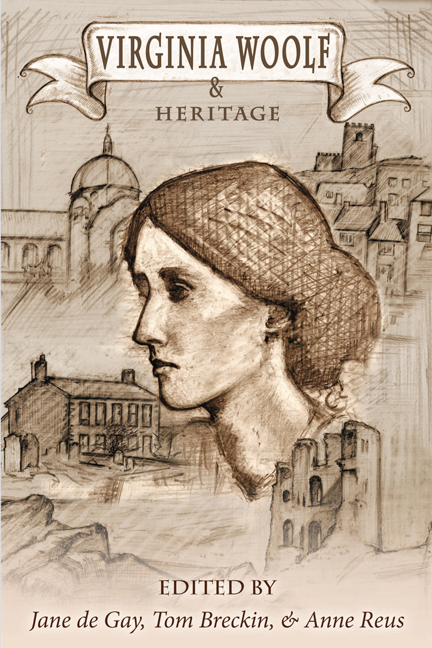Book contents
- Frontmatter
- Contents
- Introduction
- List of Abbreviations
- HERITAGE: A DEBATE
- HERITAGE, EDUCATION, AND MENTORING
- HERITAGE SPACES
- LITERARY AND CULTURAL HERITAGES
- QUEER PASTS
- MODERNISM AND HERITAGE
- WRITING LIVES AND HISTORIES
- WOOLF'S LEGACIES
- “A shadow crossed the tail of his eye”: The Reception of Virginia Woolf in Romania: Heritage Transformed
- Woolf 's Imaginarium: Exploring Virginia Woolf 's Legacy to Contemporary Polish Culture
- An Office of Her Own? Alice Munro and the Legacy of Writing with In-Authority
- Thinking Back through Virginia Woolf: Woolf as Portal in Lidia Yuknavitch's The Small Backs of Children
- The Malicious Gene: An Evolutionary Games Strategy? Woolf 's Hawkish Inheritance
- FINALE
- Notes on Contributors
Thinking Back through Virginia Woolf: Woolf as Portal in Lidia Yuknavitch's The Small Backs of Children
from WOOLF'S LEGACIES
- Frontmatter
- Contents
- Introduction
- List of Abbreviations
- HERITAGE: A DEBATE
- HERITAGE, EDUCATION, AND MENTORING
- HERITAGE SPACES
- LITERARY AND CULTURAL HERITAGES
- QUEER PASTS
- MODERNISM AND HERITAGE
- WRITING LIVES AND HISTORIES
- WOOLF'S LEGACIES
- “A shadow crossed the tail of his eye”: The Reception of Virginia Woolf in Romania: Heritage Transformed
- Woolf 's Imaginarium: Exploring Virginia Woolf 's Legacy to Contemporary Polish Culture
- An Office of Her Own? Alice Munro and the Legacy of Writing with In-Authority
- Thinking Back through Virginia Woolf: Woolf as Portal in Lidia Yuknavitch's The Small Backs of Children
- The Malicious Gene: An Evolutionary Games Strategy? Woolf 's Hawkish Inheritance
- FINALE
- Notes on Contributors
Summary
Woolf wrote: “We think back through our mothers, if we are women”; this meant thinking back through the legacy of her literary foremothers, if not always with filial respect (AROO 76). Thinking through Charlotte Brontë, Woolf famously criticizes the anger in Jane Eyre; by distinguishing between Brontë's approach and her own, Woolf creates space for her own literary creation.1 The relationship between literary foremothers and daughters is one of affiliation, as well as separation and growth, if not outright arguments and door-slammings. And so we in turn find ourselves thinking back through Virginia Woolf; her legacy is profound and ongoing. But who amongst you has ever wanted to shout “I am not Virginia Woolf!” as the main character does in Lidia Yuknavitch's 2015 novel The Small Backs of Children? (7). Or perhaps you have felt, as the same character does while reading A Room of One's Own: “A woman must have money and a room of her own if she is to write fiction. What a crock. Fuck you, old girl, old dead girl” (7). Thus Yuknavitch's main character, a woman writer troubled with a traumatic past, expresses her debt to Woolf with a bit of brash ambivalence; that these are the first words this character speaks in Small Backs belies her debt to Woolf 's influence. Indeed, Lidia Yuknavitch—a contemporary American writer and academic—has spoken of Woolf as the “portal” through which Yuknavitch approaches her own writing, a portal she shares with most of us (“Gratitude”).
The Small Backs of Children is an experimental, sometimes challenging, novel that defies generic conventions. As in Woolf 's Three Guineas, The Small Backs of Children takes as its subject the impact of war and violence on the bodies of women and girls; this is probably its most significant debt to Woolf and the one which I will spend most of this talk discussing. It also uses multiple narrators to tell its story; as in Woolf 's The Waves, these multiple voices create a collective consciousness greater than any individual perspective. Further, Yuknavitch mixes the “granite and rainbow” of autobiographical fact and fiction to craft a story that is a groundbreaking mixture of the two; this novel is an echo of Yuknavitch's 2011 memoir The Chronology of Water, and makes free use of the autobiographical details of Yuknavitch's own life detailed there.
- Type
- Chapter
- Information
- Virginia Woolf and Heritage , pp. 251 - 256Publisher: Liverpool University PressPrint publication year: 2017



